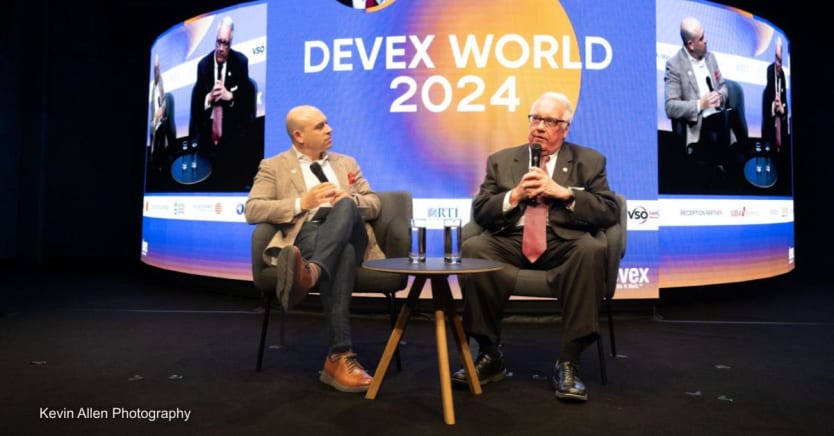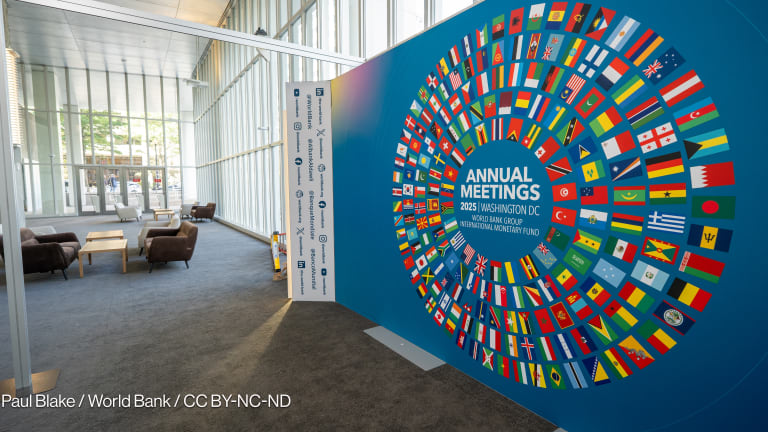
Inside a theater in Washington, D.C., was a portal that transported people to a favela in Brazil. In contrast to the sun-strewn, warehouse-size Studio Theatre stood a small, dark room where three chairs were arranged in a semicircle, facing a wall that projected three life-size people, also seated in a semicircle.
On screen were two community workers from a favela in São Paulo, joined by a friend. When my colleague Ayenat Mersie took a peek inside, they were discussing the pride associated with the word “favela” with two Action Against Hunger employees. By the end of the conversation, one Action Against Hunger staff member said it felt as if they truly knew each other, and they exchanged Instagram handles before saying goodbye.
The immersive experience was part of Devex World 2024, our flagship event held in Washington, D.C., last Thursday on the sidelines of the World Bank-International Monetary Fund annual meetings.
In many ways, our all-day summit could not have been more different from those buttoned-up meetings across town, although there was some natural overlap — we are both in the business of development after all. The World Bank’s number two talked about the struggles of raising funds in a time of overwhelming need, while experts mulled over how multilateral development banks can tackle the twin crises of poverty and climate change.
But we didn’t just have finance types. We had filmmakers, a former USAID administrator, a historian, health leaders, Democratic and Republican operatives, and a slew of nonprofit execs. We even had a big-time, elusive philanthropist.

On-the-ground perspective: No, I’m not talking about Bill Gates. That guy is everywhere. I’m talking about Howard Buffett, the son of uber-investor Warren Buffett who wears many hats: farmer, onetime county sheriff, conservationist, author, photographer, and advocate for Ukraine.
While his unassuming style and quirky anecdotes earned laughs from the audience, it was his passion for defeating Russian President Vladimir Putin that had everyone silent.
“We have enemies that absolutely want to take away every freedom that you have, and that's who Ukraine is fighting,” he warned.
“Our narrative has been this kind of false statement of, ‘We're going to stand with Ukraine as long as it takes,’ and that doesn't really mean much, because right now what we're doing is standing with Ukraine long enough for them to fight and die, and we have no strategy,” he argued.
“Innocent civilians have been killed. Women have been raped. People have been executed — and all of this is documented,” he added. “There's just no way to comprehend it, to be honest with you, and so it makes it very hard to articulate it and convey it to people.”
Read: From farms to war zones — the down-to-earth billionaire (Pro)

Plainspoken and practical: Another down-to-earth food guy took on the thorny topic of foreign aid. David Beasley, former executive director of the World Food Programme, understands tight budgets — and how to loosen purse strings. He raised a record-breaking $55 billion over his six-year tenure at WFP, Devex Senior Editor Tania Karas writes.
A plainspoken Republican and onetime South Carolina governor, he also understands how to talk to aid skeptics.
“If you’re not going to do it out of the goodness of your heart, of loving your neighbor, then you better do it out of your financial interest, in your national security interest,” he said of how he speaks to governments and decision-makers around the world.
“You talk about the IPC level 3, 4, 5, that’s just like — what are you talking about?” he said of the Integrated Food Security Phase Classification. “But you explain it in simple terms: People are starving, and here’s what’s happening. So a child along our border, a child shelter’s like $3,750 a week, $60 million a week [total]. We can have a resilience program back in Guatemala for [$1] to $2 a week.”
“‘So Mr. Anti-aid, do you want to spend $3,750 a week, or $1 to $2 a week?’ You’ve got to make it that practical.”
Read: David Beasley believes the US can once again lead on foreign aid (Pro)
+ A Devex Pro membership helps sustain the journalism we bring you. Not yet gone Pro? Start your 15-day free trial today to access all our expert analyses, insider insights, funding data, exclusive events and career resources, and more. Check out all the exclusive content available to you.
Gayle-force winds

“We’re so excited to be in the room that I think we risk apologizing for being at the table.”
— Gayle Smith, former USAID administratorSmith, who served in the Clinton, Obama, and Biden administrations, said she repeatedly saw how development was relegated to being an afterthought, rather than a tool to catalyze safety, security, and progress throughout the world, my colleague Elissa Miolene writes.
Aid shouldn’t be seen as a “side project for do-gooders,” Smith said. It should be seen for its strategic value, and its ability to make every country safer.
“This community is really good at storytelling, but we gotta tell other chapters in our stories,” she said. “Foreign aid isn't something that gets people excited. Outcomes get people excited. And our message needs to be more than just ‘we need this many dollars’ — which is going to blow up politicians’ heads — but the outcome.”
Read: Development must stop apologizing, says former USAID administrator (Pro)

Authentic voices: Storytelling is key to driving home those development outcomes — but only if it’s done the right way.
“Film can do damage if it's not done well, if it's not authentic,” warned Elisa Gambino, the Emmy Award-winning head of One Production Place, a studio that specializes in global health documentaries.
The discussion about the power of filmmaking to achieve social change featured a clip in which interviewees in Kenya were told what to say and do, including such basics as how to “smile and talk” and how to “comfort” a child.
Gambino’s studio rejected the “very dehumanizing” footage, explaining how it illustrated her determination to film with “humility.”
“Often the most harm happens in communities where voices are not heard — not communities where people are voiceless, they're not, but where their voices are not heard.”
Read: Why filmmaking harms global south communities when ‘it’s not authentic’
+ ICYMI, Devex is officially on Telegram and WhatsApp! Join our channels to receive updates on the latest global development news directly to your mobile device.

Growing divide: Dr. John Nkengasong has a powerful story to tell: The remarkable evolution of HIV/AIDS from a death sentence into a manageable chronic disease. Now he just has to convey that story to U.S. politicians who’ve put the disease in the rearview mirror — and convince them to fund PEPFAR, the landmark U.S. global HIV/AIDS initiative that he leads.
“If you take your eyes off the ball … the gains that you've made over the years will be eroded,” Nkengasong said.
PEPFAR’s future remains uncertain as it faces another reauthorization next year by the U.S. Congress — which will happen in the wake of a divisive presidential election next month, writes Devex Senior Reporter Sara Jerving. Nkengasong said PEPFAR has long enjoyed bipartisan support and his appeal to Congress is to not “let the good work go to waste.”
“I wake up every morning thinking of PEPFAR as the greatest act of humanity in solving infectious disease challenges that I know of in the world — in the history of the world — driven by one single country,” Nkengasong said. “This is our strongest soft diplomacy.”
Read: John Nkengasong — first battle against HIV was won, but war isn't over (Pro)
+ On Nov. 12, a week after the U.S. election, we’ll host a roundtable of experts with firsthand experience of politics and aid in the U.S. to discuss the election outcome and its ramifications. Register now to be part of the conversation.

DFC for yourself: There’s no shortage of organizations asking Congress to cough up money. That includes the U.S. International Development Finance Corporation whose expansion is one of several proposed changes in a bill approved by the House Foreign Affairs Committee to reauthorize the agency, with a similar bill underway in the Senate, writes my colleague Adva Saldinger.
In the meantime, DFC is enjoying a banner year, committing a record $12 billion across 181 deals in 44 countries — more than double the agency’s investment level compared to five years ago when it was founded. It also comes on the heels of a major reorganization and rapid hiring spree that have expanded the agency to almost 700 employees, nearly double its original size.
Scott Nathan, head of DFC, praised the bipartisan congressional support that has propelled this growth.
“It's enabled us to build the team and build the scale we need to keep that going. It's enabled us to increase our level of activity,” he said. “But if we don't get reauthorized … that would be a really squandered opportunity.”
Read: DFC has record year following reorganization, but needs reauthorization (Pro)

Money for something: Whether it’s Congress or philanthropists, donors expect to see rapid, measurable results — which can come at the cost of long-term, holistic solutions, my colleague Catherine Cheney writes.
“‘Projects’ is a bad word in my lexicon, right? Because when you do projects, you're saying, ‘I don't care about understanding the big system. I'm going to do my beautiful little thing,’” Rakesh Rajani, president of JustSystems, said at Devex World. “And however beautiful it is, it's not going to reach the scale that it needs to, and it's not going to last over time.”
Read: How philanthropy can move from quick wins to long-term impact (Pro)
What, why, and how
• What the US election means for global development (Pro)
• Why the Pandemic Fund is considering an emergency financing mechanism (Pro)
• How to go from digital silos to inclusive digital public infrastructure (Pro)
+ Can’t get enough of Devex World? Check out our focus page to see every single story.
Sign up to Newswire for an inside look at the biggest stories in global development.








